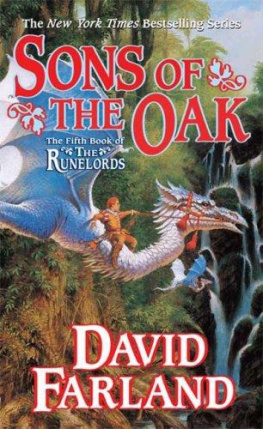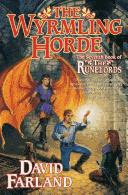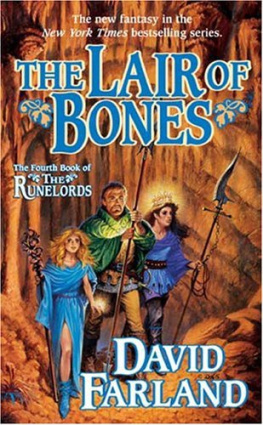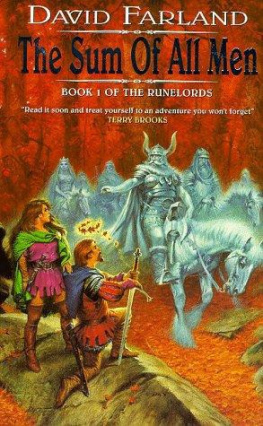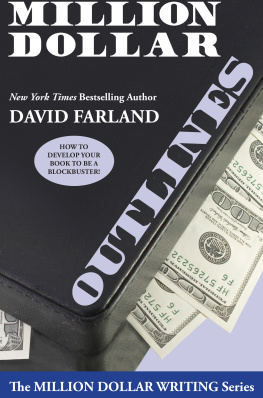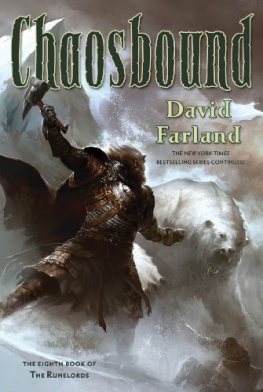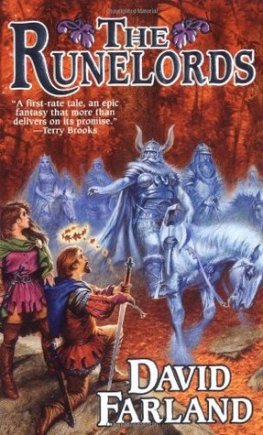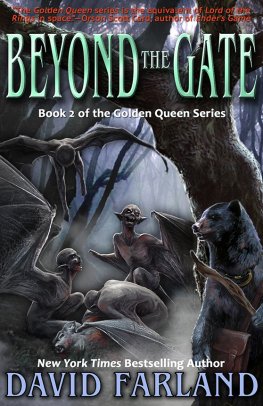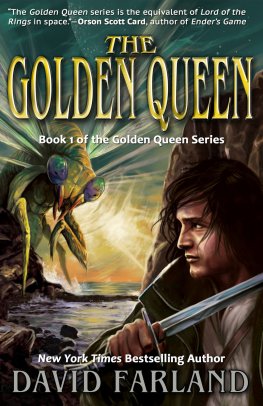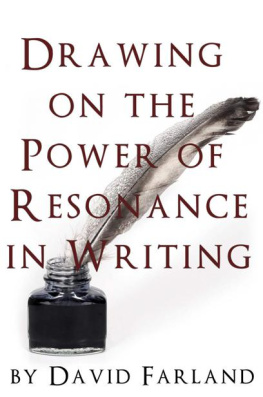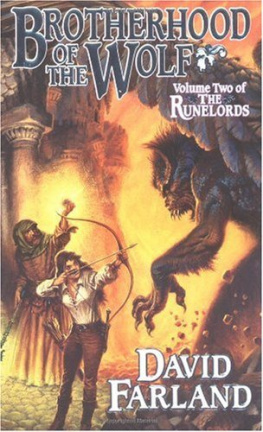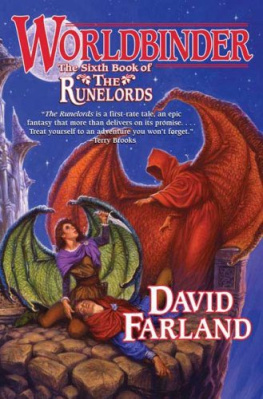David Farland - Sons of the Oak
Here you can read online David Farland - Sons of the Oak full text of the book (entire story) in english for free. Download pdf and epub, get meaning, cover and reviews about this ebook. year: 2006, publisher: Tom Doherty Associates, genre: Art. Description of the work, (preface) as well as reviews are available. Best literature library LitArk.com created for fans of good reading and offers a wide selection of genres:
Romance novel
Science fiction
Adventure
Detective
Science
History
Home and family
Prose
Art
Politics
Computer
Non-fiction
Religion
Business
Children
Humor
Choose a favorite category and find really read worthwhile books. Enjoy immersion in the world of imagination, feel the emotions of the characters or learn something new for yourself, make an fascinating discovery.
- Book:Sons of the Oak
- Author:
- Publisher:Tom Doherty Associates
- Genre:
- Year:2006
- Rating:5 / 5
- Favourites:Add to favourites
- Your mark:
- 100
- 1
- 2
- 3
- 4
- 5
Sons of the Oak: summary, description and annotation
We offer to read an annotation, description, summary or preface (depends on what the author of the book "Sons of the Oak" wrote himself). If you haven't found the necessary information about the book — write in the comments, we will try to find it.
Sons of the Oak — read online for free the complete book (whole text) full work
Below is the text of the book, divided by pages. System saving the place of the last page read, allows you to conveniently read the book "Sons of the Oak" online for free, without having to search again every time where you left off. Put a bookmark, and you can go to the page where you finished reading at any time.
Font size:
Interval:
Bookmark:
Sons of the Oak
Book 5 of The Runelords Saga
by David Farland
To Rick and Amy White, with gratitude for their
friendship and support through
a difficult time
 PROLOGUE
PROLOGUE 
Asgaroth sent his consciousness across the stars, past nebulae of flaming gases, past black holes that sucked in all matter, beyond galaxies dying and gone cold, until he stood upon the broken remnants of the One True World before his master, Shadoath.
She appeared to him as a goddess of shadow, a petite woman, sleek and elegant, her supple limbs the very definition of grace, raven hair cascading down bare shoulders, her smooth skin as flawless as perfect virtue, her lips so red that blood would envy it.
A shadow slanted across her face, hiding her features, but her eyes sparkled like black diamonds.
She sat upon a marble dais in a garden, with trees twisting up like thick serpents, their dark leaves hissing in a hint of wind, while among them sweet doves sang their night songs.
In the hollows among the trees stood her guardians, those who worshipped her, those whose love enslaved them. Once, in a previous life, Asgaroth had grown a cancer on his shoulder. For weeks a fevered hump had amassed, swelling so quickly that he could almost watch it. He knew that it would kill him in time, and had watched it with morbid dispassion, until finally one day the skin above it had grown so taut that it could no longer hold, and a rip appeared. From out of it he saw the cancer: a grotesque fleshy head with a mouthful of crooked teeth, a single milky eye, and some ragged hair.
He had looked upon it with dispassion, laughing. It is my true self revealed at last! hed whispered.
But those who guarded Shadoath were more twisted still, mere humps of flesh with crooked backs that surely could not attain higher thought. They seemed to sprout heads and arms almost at random. He saw one that had three full hands budding from a single arm, yet it held a silver scimitar in one of those hands with expertness, its swollen fingers like red claws wrapped painfully about the hilt.
Shadoath watched him approach with dispassion. They had spoken countless times before, over the millions of millions of years.
Mistress, Asgaroth whispered. The torch-bearer has chosen a new form.
Asgaroth showed her a vision of Queen Iome Sylvarresta, her womb swelling with new life, a spirit shining like a fallen star beneath the flesh.
Shadoath showed no emotion. It had been ages since this torch-bearer had last shown himself. He had been in hiding, for centuries, purifying himself, firming his resolve.
What does he desire? Shadoath asked.
Asgaroth showed her a vision of the world of the Runelords, a world healing after the fierce battles between the reavers and the Earth King, a world healing more than any world should, a world remaking itself in the shape of the One True World. He has found it: a world that holds the memory of the master rune. The restoration is at hand!
This caused Shadoath to rise. Once, so long ago that even the memory of the events had faded, so that now it was only a legend, the Dark Master had sought to seize control of all creation, had sought to bind all that existed to her. But her efforts had failed, the master rune itself was broken, and at that time, the One True World had shattered, splintering into a thousand thousand shadow worlds, each but a dim reflection of the perfect world that had been.
With its destruction, the knowledge of the master rune was lost. Long had Asgaroth believed that reality was like a shattered crystal, each shadow world a shard of what had been. And one of those shards would still know the shape of the master rune.
Now, they had found that shard. And with the knowledge, the master rune could be rebuilt. The shadow worlds could be bound in one, all worlds colliding to make a perfect whole.
He will seek to bind the worlds, Shadoath said.
Both Shadoath and Asgaroth had amassed a wealth of knowledge about magic. But neither knew the key to binding the worlds, to bringing forth the restoration.
Then we must make sure that he is under our sway, Asgaroth said. After his birth, it will take time before he fully awakens to his power. The torch-bearer will be vulnerable.
Then we should plant the seeds of his destruction now, Shadoath said. You know what to do. Open a gate to his world, and I will bring my armies and join you.
Asgaroth smiled. Shadoaths resources were unbounded, her cunning unsurpassed, her cruelty inspired. Compared to her, the monster Scathain who had lost against the Earth King was but a worm. She had defeated the torch-bearer countless times before. She would defeat him one last time, in this the most desperate of contests. For this time it was not a single world that hung in the balance, it was all creation.
An open gate awaits you, Asgaroth said, and he showed her a vision of a tiny village, burned to slag there among the woods. Chimneys of blackened stone were all that was left of the houses. On a patch of ashes, among ash-covered bones, green flames glowed, creeping along the ground.
At that moment, the Earth King Gaborn Val Orden was taking a late meal. He set down his wine goblet and felt vaguely disturbed. He tilted his head as if listening. He felt something.A keen sense of danger that prickled the hair on his scalp. But it was distant, in the future. And it was not targeted at a certain person. It was diffuse, and vast. It was an evil large enough to lay waste to an entire world.


PERFECTING THE DARKNESS
No one can truly be called a man so long as he basks in the light of his father and mother. For until we are forced to stand alone, we never know the measure of strength that abides within us. And once a boys father dies, he cannot be called a child any longer.The Wizard Binnesman
This was the face of the Earth King: Skin the shade of dark green oak leaves, fading in the fall. Old mans hair of silver webs. A sorrowful face as full of furrows as the rind of a rotting apple. And green-black eyes that were wild, hunted, like the eyes of a stag in the forest.
That is how Fallion, at the age of nine, remembered his father. A father he had not seen now for three years.
Strange then, that on an autumn evening as Fallion rode on a mountain track outside Castle Coorm with his younger brother Jaz and Hearthmaster Waggit beside him, and a small contingent of guards bristling front and back, the image of his father should intrude so heavily on Fallions mind.
Time to turn back, the point guard, a woman named Daymorra, said in a thick accent. I smell evil.
She nodded to her right, up a hill where fences of stacked gray stones parceled out some cowherds lands and formed a dam that held back the leaning pine forests of the mountains above. There, at the edge of the forest rose a pair of barrows, houses for the dead. In the swiftly falling darkness, the shadows under the trees were black. And above the mountain hovered a haze, purple and green like a bruise in the sky. Strange lights flashed among the gauzy clouds, as if from distant lightning.
Fallions personal guard, Sir Borenson, laughed and said, You dont smell evil. Its a storm you smell.
Daymorra glanced back, troubled. She was a rugged woman from beyond Inkarra, with strange skin as gray as a tree trunk, black hair as fine as flax, and black eyes that glinted like lightning. She wore a simple outfit of ebony cotton covered by a supple leather vest, with an ornate steel buckler that covered her belly, and a slaves collar of silver around her neck. Neither Fallion nor anyone that he knew had ever seen anyone like Daymorra until she had shown up at the castle six months earlier, sent by Fallions father to join the guard.
Font size:
Interval:
Bookmark:
Similar books «Sons of the Oak»
Look at similar books to Sons of the Oak. We have selected literature similar in name and meaning in the hope of providing readers with more options to find new, interesting, not yet read works.
Discussion, reviews of the book Sons of the Oak and just readers' own opinions. Leave your comments, write what you think about the work, its meaning or the main characters. Specify what exactly you liked and what you didn't like, and why you think so.

